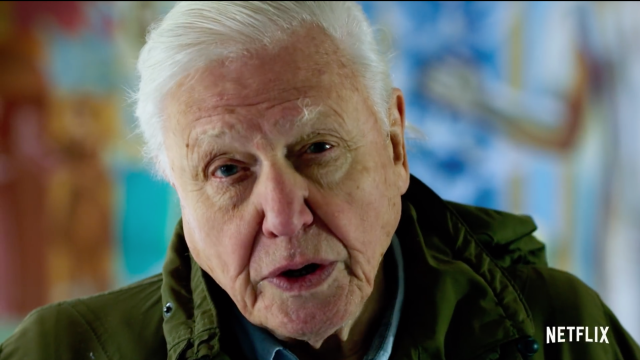David Attenborough is 93. Over the course of his lifetime, the beloved natural historian and broadcaster has seen the planet go through unimaginable changes. Atmospheric concentrations of greenhouse gases have soared, as has the human population, while biodiversity has declined precipitously. He details these shifts in a new documentary released on Netflix on Sunday, which he calls his “witness statement” for the natural world.
The new film, David Attenborough: A Life on Our Planet, beautifully and persuasively argues in favour of a fundamental reshaping of humanity’s relationship with nature. But in doing so, it misses something more subtle: the fact that not all of humanity are equally responsible for exploiting Earth.
That’s not to say it’s not well worth a watch. The new movie is both deeply moving and visually stunning. In it, we’re treated to footage of Attenborough’s decades of adventures chronicling incredible ecosystems around the globe, from the Amazon rainforest to the Arctic.
As is typical for an Attenborough film, the footage is paired with equally lush narration, in which the historian explains the ways he saw the world shift from his up-close-and-personal vantage point. Species that were once common became scarce and hard to find. More coral, under stress from unprecedentedly high ocean temperatures, begun to expel its colourful algae and turn a deathly white. More trees were cleared for agriculture. And thanks to power plants and vehicles spewing out far more dangerous planet-warming pollutants and the devastation of the world’s carbon sinks, the planet has warmed by 1.8 degrees Fahrenheit (1 degree Celsius) in his lifetime.
“We are facing nothing less than the collapse of the living world,” he says in the movie.
If we continue business as usual, by the 2030s, the Arctic could be free of sea ice in the summers. By the 2050s, already struggling coral reefs could all but die off completely. And by the 2080s, we could see a global food shortage due to our depletion of the world’s fertile soils and the die-off of pollinators while extreme heat makes some part of Earth essentially uninhabitable.
The film doesn’t, however, explicitly discuss the unequal economic engine that’s responsible for the systems that set this devastation into motion. It’s true that the entire world is dependent on unsustainable systems. But the choice to move toward those systems wasn’t exactly made democratically. Monocultural industrial agriculture, for instance, is the product of violent land grabs and slavery, and the shift toward it has impoverished many farming communities around the world. And fossil-based energy is produced through means that subject workers and poor communities to dangerous pollution. Those same groups don’t get much say in how energy is produced, leaving at the mercy of multinational corporations more focused on profits than human well-being.
All of humanity doesn’t share equal responsibility for the damage either, as the film implies. Rather, a small subset of the global elite are the main drivers. A recent analysis by Oxfam found that the world’s richest 1% caused double the emissions of the poorest 50%, a point backed up by academic research as well. Other findings show that just 100 companies are responsible for 71% of global carbon emissions while four major biotech firms essentially control agriculture.
Though it doesn’t say who’s responsible for unsustainable practices, it does call for an end to them. To prevent catastrophe, Attenborough makes suggestions for major alterations to the systems we rely on in increasingly unsustainable ways.
These include cries to restore biodiversity, reduce our farmland, restructure our agricultural practices so they’re more sustainable and produce increased yields, change our diets, and crucially, completely halt the use of fossil-based energy altogether. The plea is markedly more urgent from the last one Attenborough narrated, 2019’s Netflix series Our Planet, which doesn’t directly discuss the industrial activity that led to climate change and biodiversity loss. When I asked Keith Scholey, the film’s director who has worked with Attenborough for more than 20 years, what sparked this change in tenor, he didn’t hesitate.
“It’s because we’ve run out of time,” he said. “If we don’t change things in the next 10 years, we’ve run out of time, we really have.”
Yet also among the suggestions are curbing population growth. The means to doing so are not objectionable. Attenborough notes that providing people with better living conditions and ensuring girls, in particular, have access to education have both been associated with lowering population growth in the past.
But again, the film misses the issue of inequitable distribution. Research shows that the world currently produces enough food to feed everyone on Earth, and yet hunger persists. Another recent study shows the world could contain billions more people if the wealthiest countries vastly curbed their energy use. This suggests that while population growth might pose some challenges, it is not the key problem. Instead, it suggests the world will have to change the fact that right now, the rich and powerful are able to make decisions based on what will grow their profits and let them live resource-intensive lifestyles, not what is best for people and the planet.
Here, Scholey and I disagree. “We can carry on in a business sense in exactly the same way,” he said. “There’s a huge fortune to be made by from clean energy. And already some countries in the world are actually rushing towards that marketplace. And you have entrepreneurs like Mr. [Elon] Musk, who are rushing towards that.”
That’s why, he said, the film documents Attenborough making appeals to not only civic leaders at United Nations summits, but also business leaders at Davos. But in our capitalist world, it’s the job of these entrepreneurs to behave in the ways that make them the most money. We cannot simply see if the market places the most value on sustainable practices. We have to ensure no one is allowed to devalue life, human or nonhuman, on the planet in centuries to come.
